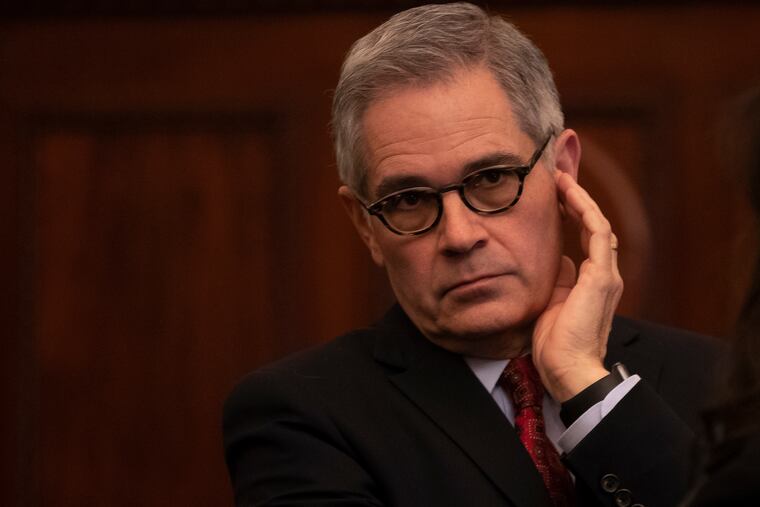Judge denies Krasner office’s request to vacate death penalty in 1984 double murder
U.S. District Judge Mitchell Goldberg denied a request by the DA's Office to vacate the death penalty for a Philadelphia man who had been convicted of two counts of first-degree murder in the 1984 strangulation-and-drowning deaths of an evangelist pastor’s son and the son’s wife.

A federal judge on Monday denied a request by the Philadelphia District Attorney’s Office to vacate the death penalty for a Philadelphia man convicted of the 1984 strangulation and drowning deaths of a prominent pastor’s son and daughter-in-law in their East Mount Airy home.
U.S. District Judge Mitchell Goldberg wrote that for three decades, the DA’s Office had “consistently and zealously opposed” inmate Robert Wharton’s efforts to overturn his conviction and death sentence.
Early last month, the office informed the judge it would no longer fight the appeal. Max Cooper Kaufman, supervisor of the federal litigation unit under District Attorney Larry Krasner, wrote that the decision came after the office reexamined the case and communicated with the victims’ family.
In his written opinion, Goldberg described the deaths of Bradley Hart, 26, and his wife, Ferne, 31, as “particularly horrific” and noted the DA’s Office didn’t explain the reason behind what he called "this complete reversal of course.”
He ordered both parties to submit briefs explaining their positions.
Krasner, a former criminal defense lawyer who took office last year, campaigned on a platform of never seeking the death penalty. His spokesperson, Ben Waxman, said by email Monday that the office had no comment on Goldberg’s ruling “except to say that we are reviewing the opinion and considering next steps in the case."
The Federal Community Defender Office, which is representing Wharton, did not immediately respond to a request for comment.
Wharton’s co-defendant, Eric Mason, was sentenced to life in prison. Both men, construction workers from Germantown, were 20 at the time of the murders.
Now 56, Wharton is on death row at the State Correctional Institution-Phoenix in Montgomery County.
According to evidence in the case, on the night of Jan. 30, 1984, Wharton and Mason went to the Harts’ home, tied up the couple, and separated them. Wharton choked Ferne Hart with a necktie and drowned her in a bathtub. Mason denied killing anyone, but was accused by Wharton of killing Bradley Hart by forcing his face in water and strangling him with an electrical cord.
After the jury at his 1985 trial convicted Wharton of first-degree murder, Assistant District Attorney Thomas Bello argued that both defendants should be sentenced to die, noting that they turned the heat off in the house and left the couple’s 7-month-old daughter, Lisa, to die.
Hart’s father, the Rev. B. Sam Hart, a nationally known evangelist pastor, discovered the couple’s bodies. The baby was unharmed but suffering from malnutrition and dehydration.
Bello told jurors that Wharton wanted revenge against the Hart family after he was not paid for construction work he had done at a religious radio station in Phoenixville managed by Bradley Hart and owned by his father. The Harts had fired the subcontractor for whom Wharton worked because they were unsatisfied with the job.
The prosecutor also told jurors that Wharton had previously committed two burglaries at the Harts’ home and, with Mason, had burglarized the Rev. Hart’s church, the Germantown Christian Assembly in East Mount Airy.
In April 1992, the Pennsylvania Supreme Court partially granted Wharton’s appeal, ordering a new sentencing hearing. That December, a second Philadelphia jury reimposed the double-death sentence for Wharton.
In December 2002, then-Gov. Mark Schweiker signed his death warrant, but the execution was stayed after Wharton appealed to federal court.
Goldberg in 2012 denied his petition, but an appellate court sent it back to the district judge on just one claim — whether his lawyer was ineffective for failing to tell the jury about Wharton’s adjustment to prison. That was the claim the District Attorney’s Office last month said it would not fight.
The DA’s Office also asked the judge to grant summary relief by taking the death penalty off the table and said that if the judge did so, prosecutors wouldn’t seek a new death sentence in state court.
Krasner has received pushback by the judiciary in at least one other case in which his office tried to throw out a death sentence.
In October, Pennsylvania Supreme Court Justice Christine Donohue wrote in a majority opinion that a jury had approved the death penalty for Lavar Brown, and the DA’s Office couldn’t change that result “based upon the differing views of the current office holder.”
Pennsylvania’s death penalty has been used just three times since it was reinstated by the state in 1978. Gov. Tom Wolf imposed a moratorium on its use in 2015. Wolf’s spokesperson said Monday that the governor believes the moratorium should continue in light of a June 2018 report by a bipartisan legislative task force and advisory committee, which found various problems concerning the death penalty.